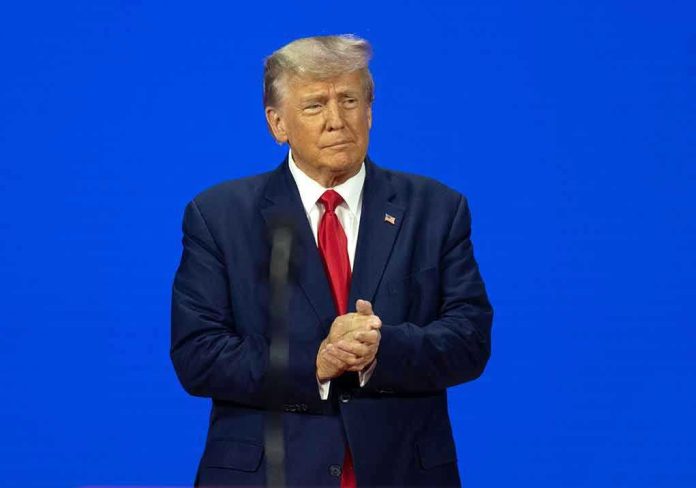
President Trump’s latest warning to foreign governments is shaking up the global tech landscape, as he links tariffs to the defense of American free speech and sovereignty.
Story Snapshot
- Trump threatens tariffs against countries enacting tech regulations hostile to U.S. companies.
- Free speech and national sovereignty are central to Trump’s stance, echoing conservative priorities.
- Civil liberties groups caution about potential executive overreach and the limits of presidential power.
- The episode escalates diplomatic tensions and highlights ongoing global battles over digital regulation.
Trump’s Tariff Threat: Framing Free Speech as a National Interest
President Trump used Truth Social to warn foreign governments—particularly in Europe—against passing laws that target or restrict American tech companies. He declared his willingness to impose tariffs as a direct response, tying economic retaliation to the defense of free speech and the protection of U.S. consumers. Trump’s approach positions America as a bulwark against international efforts that could silence speech or erode U.S. sovereignty, and signals a readiness to wield economic power to defend these principles. This move resonates with conservatives concerned about the erosion of constitutional values and foreign interference in the digital realm.
Trump’s warning is not occurring in a vacuum. For years, the U.S. has debated how far tech companies should go in moderating content, with Section 230 of the Communications Decency Act providing broad legal protections to platforms. Internationally, the European Union and other governments have enacted sweeping regulations, such as the EU Digital Services Act, imposing stricter controls on content moderation and data privacy. These rules disproportionately impact U.S.-based firms like Meta, Google, and X. Trump’s latest message distinguishes itself by explicitly linking tariffs to foreign tech laws, framing tech regulation as both a free speech and a sovereignty issue. This hardline stance is a response to what many on the right view as leftist overreach and globalist policy creep.
Key Stakeholders and Power Struggles
Several groups are directly implicated in this escalating standoff. President Trump and his administration are leveraging U.S. economic power to assert national interests. American tech giants—Meta, Google, X—stand to lose market access or face heavy compliance costs if foreign regulations take hold. Foreign governments, chiefly in the EU, justify their rules as necessary for consumer protection and digital sovereignty, but these actions are increasingly seen by U.S. policymakers as protectionist. Civil liberties organizations like the ACLU and FIRE, while traditionally defenders of free speech, have voiced concerns that aggressive executive actions, such as funding threats or punitive tariffs, risk executive overreach and could chill lawful expression. The tension between the executive branch, Congress, courts, and an emboldened civil society underscores the complexity of balancing national sovereignty, constitutional rights, and global commerce.
Trump’s previous actions set the stage for this confrontation. His 2019 executive order targeted social media companies for alleged anti-conservative bias, and his administration has consistently challenged foreign digital service taxes and regulatory schemes. Now, by threatening tariffs, Trump is escalating the playbook—making clear that economic tools will be used to protect American interests, free speech, and market access. However, civil liberties advocates and legal scholars stress that the president’s authority to unilaterally impose tariffs or restrict funding based on speech or regulatory disputes is constitutionally limited and subject to judicial and legislative checks.
Implications for U.S. Policy, Industry, and Global Relations
Trump’s warning has immediate and long-term consequences. In the short term, it raises the stakes in diplomatic negotiations, especially with the European Union, and injects uncertainty for U.S. tech firms operating abroad. The prospect of trade retaliation and regulatory fragmentation looms large. In the long term, the precedent of using tariffs as leverage in speech-related disputes could entrench digital sovereignty and deepen global polarization over tech governance. For conservatives, Trump’s approach may feel like a necessary defense against foreign and leftist agendas that threaten American values and the Constitution. Yet, critics warn of the dangers of retaliation, international discord, and the potential to undermine the very free speech principles the policy purports to protect.
Industry experts and scholars offer a range of perspectives. The Brookings Institution notes that highly partisan tech policy risks worsening polarization and undermining democratic norms. Legal experts highlight that while the president can wield significant influence, the scope of executive authority is checked by law and precedent. Civil liberties organizations argue that punitive economic actions can chill speech—not just abroad, but at home—if not carefully constrained. The episode ultimately underscores the ongoing battle over the boundaries of free expression, the power of big tech, and America’s place in a fractured digital world.
Expert and Civil Society Reactions
Trump’s rhetoric has energized his base and drawn sharp criticism from civil liberties groups. Supporters argue that defending U.S. tech companies and free speech on the world stage is both principled and pragmatic, especially in the face of aggressive foreign regulation. Detractors, including the ACLU and FIRE, caution that executive threats—whether tariffs or funding cuts—risk undermining constitutional protections and academic freedom. This debate exposes fundamental questions about the proper limits of government power, the role of the U.S. in global tech policy, and the enduring struggle to safeguard conservative values in a rapidly changing digital environment. As legal and policy battles continue, the outcome will shape not only the tech industry, but the meaning of free speech, sovereignty, and individual liberty for years to come.
Sources:
Project 2025: What a second Trump term could mean for media and technology policies
Statement on President Trump’s Truth Social post threatening funding cuts for illegal protests
Trump threatens ABC, NBC: Why media threats matter
ACLU sends letter urging universities to protect campus speech after Trump admin threats
Trump fired BLS’s Erika McEntarfer: What it means for job numbers




![Shocking Bot Advice: Kids in Danger [NEW RESEARCH] When the Chatbot is the Predator (Mini](https://republicannews.org/wp-content/uploads/sites/11/2026/02/NEW-RESEARCH-When-the-Chatbot-is-the-Predator-Mini-218x150.jpeg)


